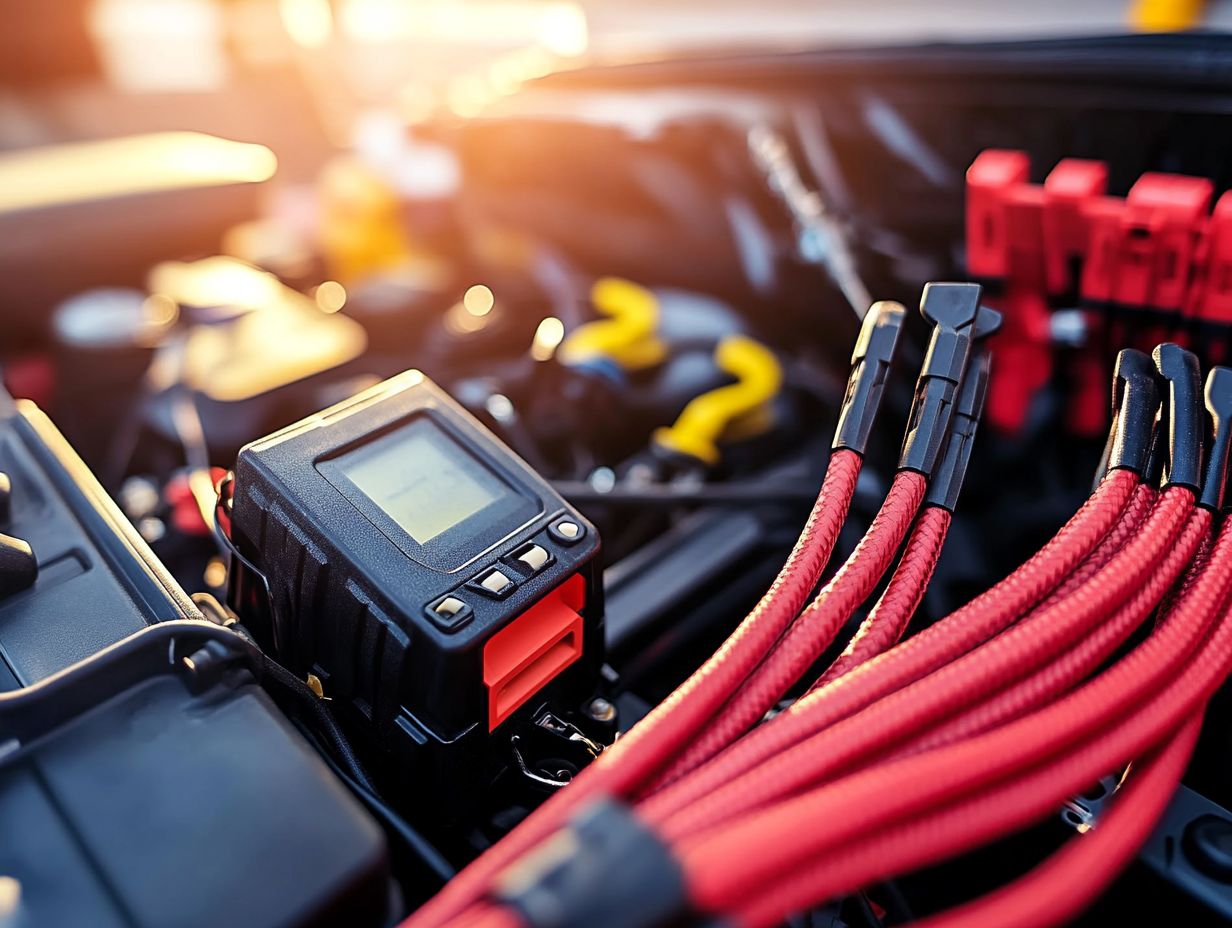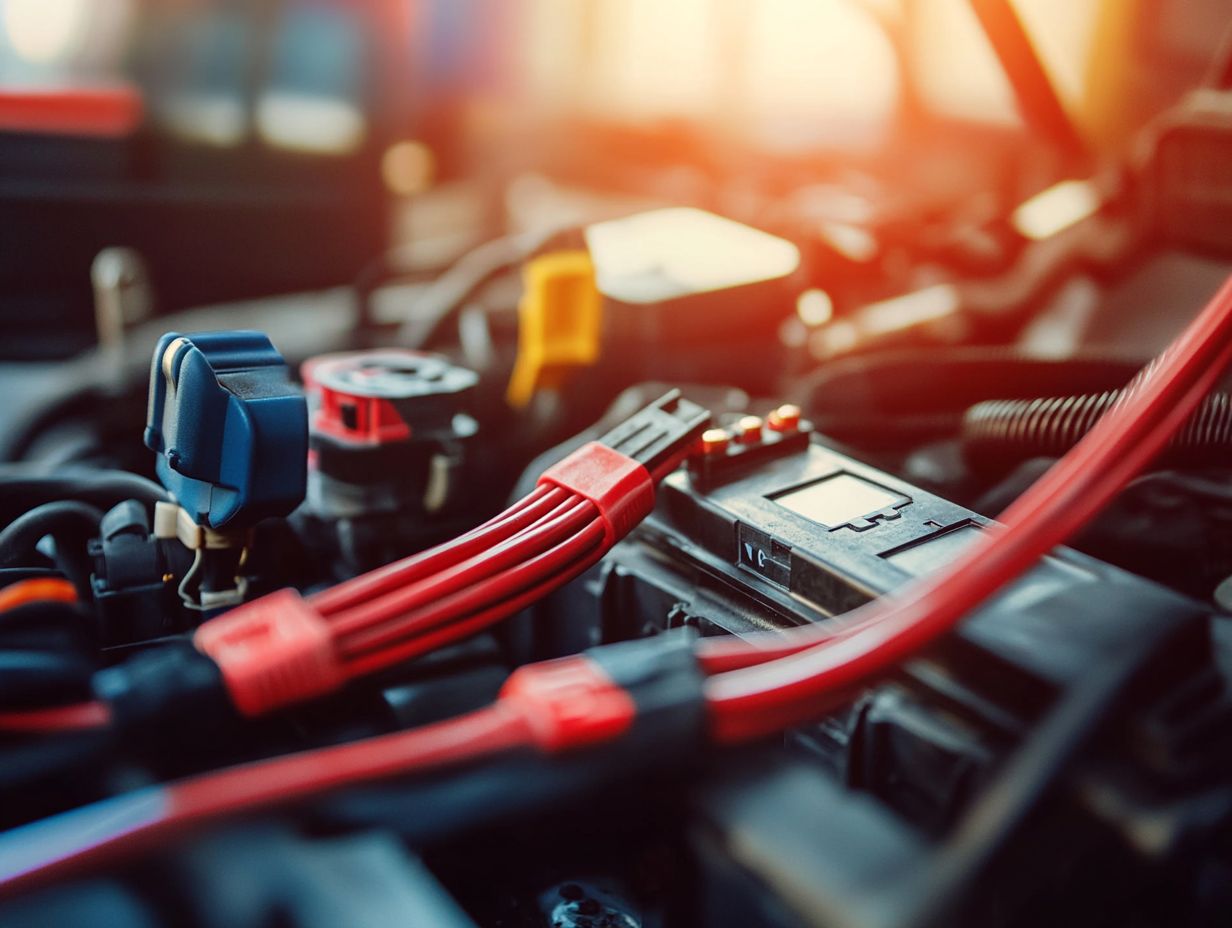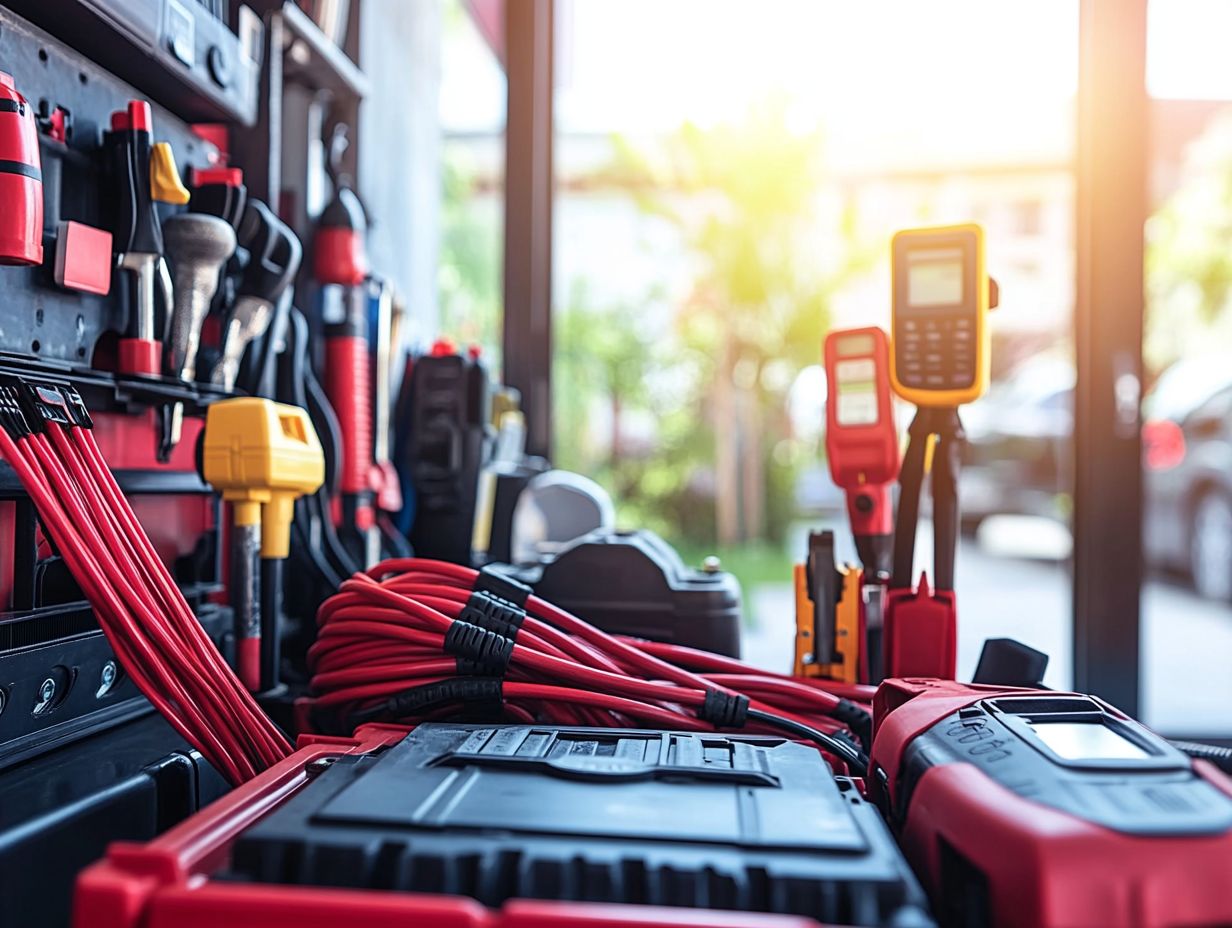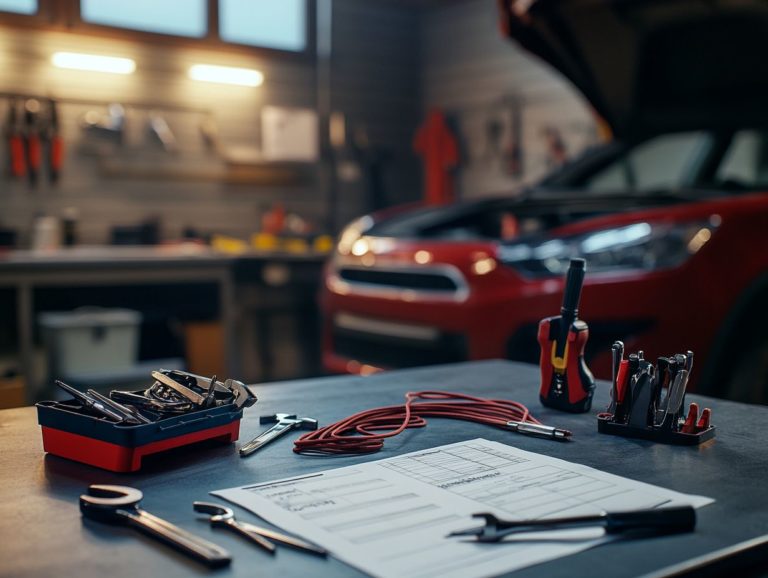How to Keep Your Car’s Battery Charged
Car batteries play an important role in the seamless operation of your vehicle, yet they often fade into the background until an issue arises.
As a car owner, it’s essential to understand the various types of car batteries, their expected lifespans, and the common signs that your battery may be losing strength.
This guide will provide you with the knowledge to maintain your battery for peak performance, introduce effective charging methods for when it s drained, and offer proactive tips to avoid unnecessary drain.
Get the insights you need to keep your car running strong! Let s dive into your battery s world today!
Contents
- Key Takeaways:
- Understanding Car Batteries
- Signs of a Weak Car Battery
- Maintaining Your Car Battery
- Charging Your Car Battery
- Preventing Battery Drain
- Frequently Asked Questions
- What are some tips for keeping my car’s battery charged?
- How can I extend the life of my car’s battery?
- What are some signs that my car’s battery needs to be replaced?
- How does cold weather affect my car’s battery?
- What should I do if my car’s battery dies?
- Is it safe to charge my car’s battery while the engine is running?
Key Takeaways:

- Regularly check your car battery’s health and understand its type to ensure optimal performance and longevity.
- Be aware of common signs of a weak car battery and take necessary steps to maintain it, such as avoiding short trips and keeping terminals clean.
- Properly charge your car battery using safe methods to avoid damage, and take preventive measures to avoid battery drain, such as turning off electronics when the car is not in use.
Understanding Car Batteries
Understanding the details of car batteries is essential for you as a vehicle owner. They serve as the heart of your electrical system, powering everything from headlights to various electric components.
A well-functioning battery guarantees reliable operation, whether you re embarking on a lengthy road trip or simply running errands.
Each type of car battery has unique features and varying maintenance needs. It s important to regularly check battery connections and remain vigilant for warning lights that might signal issues. Factors like ideal temperature and frequency of use can significantly impact your battery’s lifespan, so staying informed about the best practices for maintenance is key.
Types of Car Batteries
You have several options when it comes to car batteries today, including lead-acid, Absorbent Glass Mat (AGM), and lithium-ion batteries, each offering unique advantages.
Understanding these differences is crucial since your choice of battery directly impacts performance and efficiency.
Lead-acid batteries are known for their reliability and tend to be more affordable, but they may not last as long. In contrast, AGM batteries offer enhanced durability and superior performance in extreme conditions, though they come with a higher price tag.
Then there are lithium-ion batteries, which are gaining popularity due to their lightweight design and impressive longevity, making them particularly suitable for electric vehicles.
Choosing the right battery type affects how well your vehicle performs and plays a crucial role in proper maintenance practices that can enhance its lifespan.
Factors Affecting Battery Life
Several factors can significantly influence the lifespan of your car battery, including how you charge your battery, the environmental conditions it faces, and how often you take long drives versus short trips.
Understanding these influences is essential for maintaining optimal battery performance and longevity.
Your charging habits play a key role; consistently recharging from short trips may lead to incomplete cycles, resulting in sulfation, a buildup that can reduce battery capacity.
Extreme temperatures speed up battery degradation, making it vital to shield your battery from harsh conditions. Regularly checking the voltmeter readings can help you detect potential issues early on.
By following best practices such as keeping your battery clean, fully charging it during long periods of inactivity, and using a quality charger, you can significantly extend its life and enhance performance. For detailed guidance, check out this article on how to maintain your car’s electrical system, ensuring you stay on the road longer.
Signs of a Weak Car Battery

Don t get stranded! Recognizing the signs of a weak car battery is crucial for preventing the unfortunate scenario of being left with a lifeless battery. By detecting issues early, you can save both time and money on necessary repairs or replacements.
Common Symptoms
Common symptoms of a weak battery include dim headlights, a slow-cranking engine, and dashboard warning lights that hint at potential battery failure.
These issues can indicate various problems that compromise battery performance. Dim headlights often suggest decreased voltage, which means your battery might struggle to maintain a strong charge. Imagine the frustration of a slow-cranking engine on a chilly morning when the battery can t muster enough power to get your vehicle going.
Dashboard warning lights, like the battery warning icon, are crucial alerts that you should never ignore. Keeping an eye on these symptoms is as simple as noting the brightness of your headlights during the day and listening for any unusual sounds when starting your engine.
It s wise to schedule regular battery health checks at service stations or perform simple tests using a voltage meter at home. This ensures your battery operates reliably and safely.
Maintaining Your Car Battery
Proper car battery maintenance is essential for achieving a healthy battery that operates efficiently. By attending to this crucial aspect, you can maximize both the lifespan and performance of your battery, regardless of the conditions it faces.
Tips for Extending Battery Life
To extend the life of your car battery, implement practical strategies like using a battery charger for regular maintenance and following tips on how to maintain your car’s battery health to ensure optimal storage conditions.
One key approach is to limit exposure to extreme temperatures, as both excessive heat and severe cold can significantly impact battery performance. Store your battery in a well-ventilated area, away from direct sunlight and freezing conditions. If you don’t drive regularly, using a trickle charger helps maintain optimal charge levels without the risk of overcharging. For more insights, check out this guide on how to test your car’s battery life.
Regularly inspecting the battery terminals for corrosion and ensuring clean connections significantly contributes to prolonging its lifespan. By taking these steps, you enhance the longevity and reliability of your battery.
Charging Your Car Battery

Properly charging your car battery is essential, especially when faced with a dead battery. For tips on keeping your car’s battery in good shape, this careful attention not only restores functionality but also helps you avert potential problems in the future.
Methods for Charging a Dead Battery
Several effective methods exist for reviving a dead battery, including using a dedicated battery charger or jump-starting your vehicle from another car.
By understanding the mechanics behind these techniques, you can breathe life back into your vehicle and ensure that the charging process is safe and efficient. For instance, when using a dedicated charger, equip yourself with the right tools think proper connectors and an appropriate amperage setting. Remember, safety is key; always inspect for leaks or damage before you start.
When jump-starting, position the assisting vehicle correctly and use high-quality jumper cables to avoid potential mishaps. Pay attention to voltmeter readings; if you see a reading below 12.4 volts before charging, that signals a low charge. After charging, a reading above 12.6 volts indicates your battery is ready to go.
Preventing Battery Drain
Preventing battery drain is crucial for ensuring that your vehicle starts with confidence, particularly in extreme temperatures or after being left unused for extended periods.
Taking proactive measures to maintain your battery’s health saves you from the frustration of unexpected failures and ensures your car is always ready to go. For more detailed information, check out this guide on how to maintain your car’s electrical system.
Common Causes and Preventive Measures
Common causes of battery drain include leaving your headlights on, malfunctioning electrical components, and poor maintenance practices. Each of these factors significantly affects the health and longevity of your vehicle s battery.
For instance, leaving your headlights on for too long can quickly drain the battery’s charge, particularly if you re not starting the car regularly. Electrical issues, like a faulty alternator or unwanted power drains from accessories, can cause a slow drain even when your vehicle is off.
Neglecting routine maintenance can lead to significant issues. For example, failing to clean your battery terminals and ensure secure connections can create resistive problems that worsen battery drain over time.
To mitigate these risks, take action! Turn off all electronic devices before exiting your vehicle and schedule regular check-ups. Maintaining a proactive approach to battery care not only enhances your vehicle’s reliability but also contributes to its overall effectiveness.
Frequently Asked Questions
Here are some common questions about maintaining your car’s battery.

What are some tips for keeping my car’s battery charged?
- Regularly drive your car for at least 30 minutes to an hour to allow the battery to recharge.
- Avoid leaving your car’s electronics on when the engine is not running.
- Consider investing in a battery charger for extended periods of non-use.
How can I extend the life of my car’s battery?
- Avoid overcharging your battery, as this can damage the cells and decrease its lifespan.
- Regularly clean the battery terminals and check for any corrosion to maintain its health.
What are some signs that my car’s battery needs to be replaced?
- If your car struggles to start or if electrical components are not functioning properly, your battery may need replacement.
- If your battery is over 3 years old, it is recommended to have it tested annually.
How does cold weather affect my car’s battery?
Cold temperatures can decrease the battery’s charge and make it harder for the car to start. You can combat this by keeping your car in a garage or using a battery warmer during colder months.
What should I do if my car’s battery dies?
If your battery dies while you’re out, try jumpstarting it with the help of another car or a portable jump starter. If it continues to die, it may be time for a replacement.
Is it safe to charge my car’s battery while the engine is running?
No, charging your car’s battery while the engine is running is not recommended, as it can damage the alternator and other electrical components. It’s best to turn off the engine before jumpstarting or charging the battery.
Check your battery today for peace of mind on the road!





